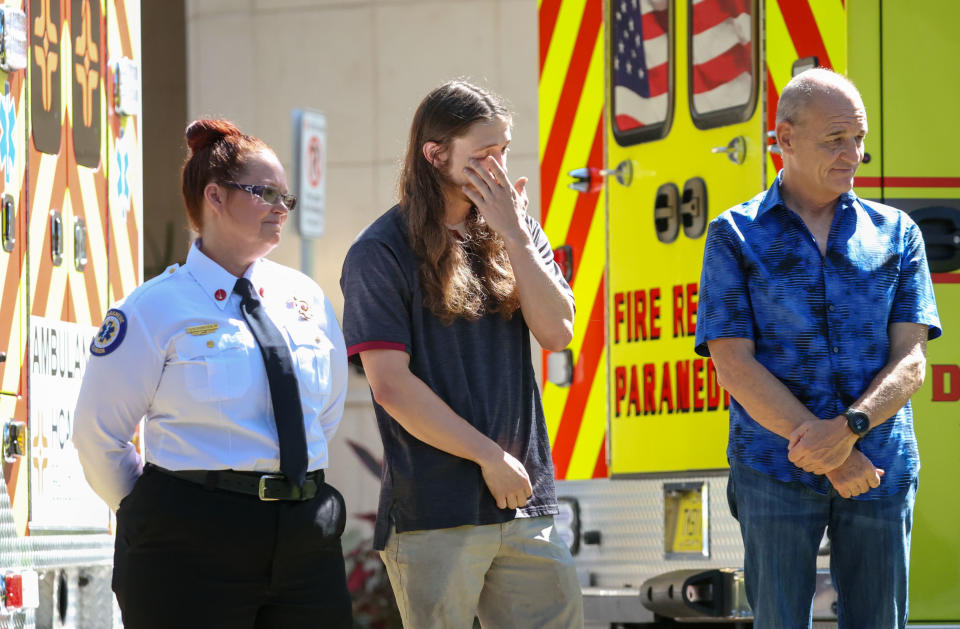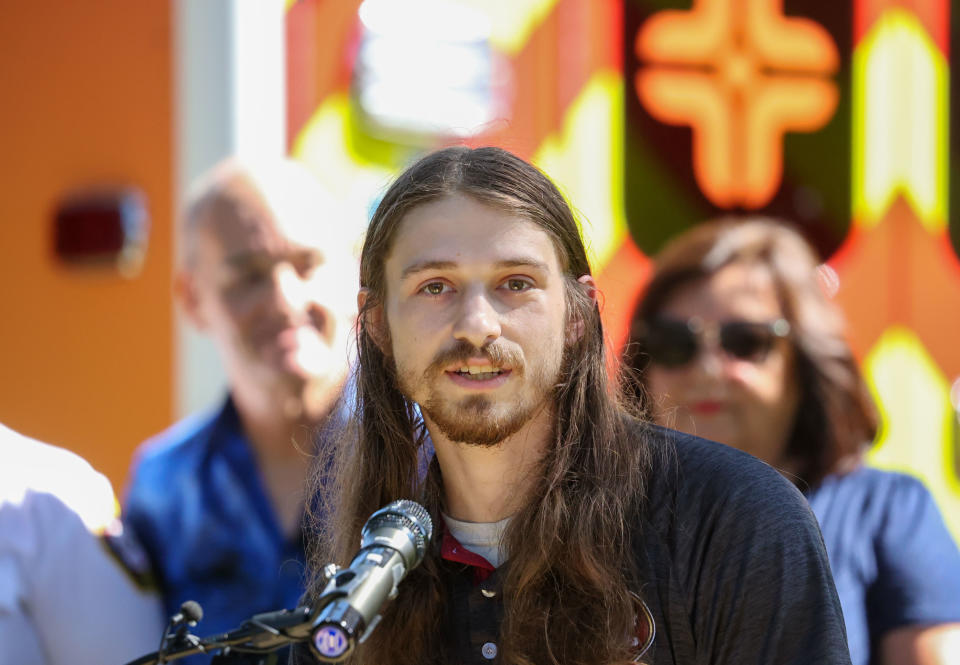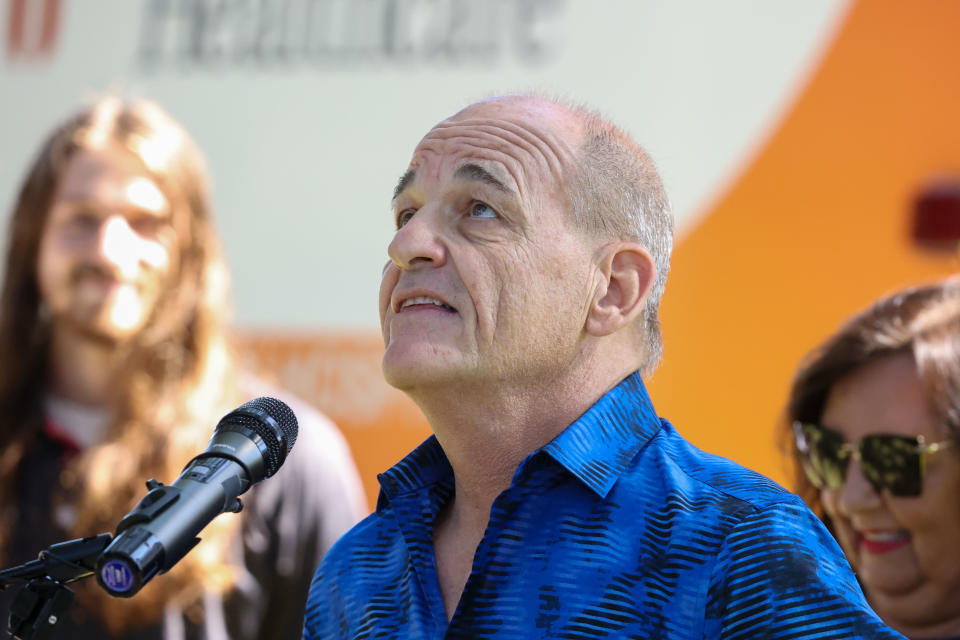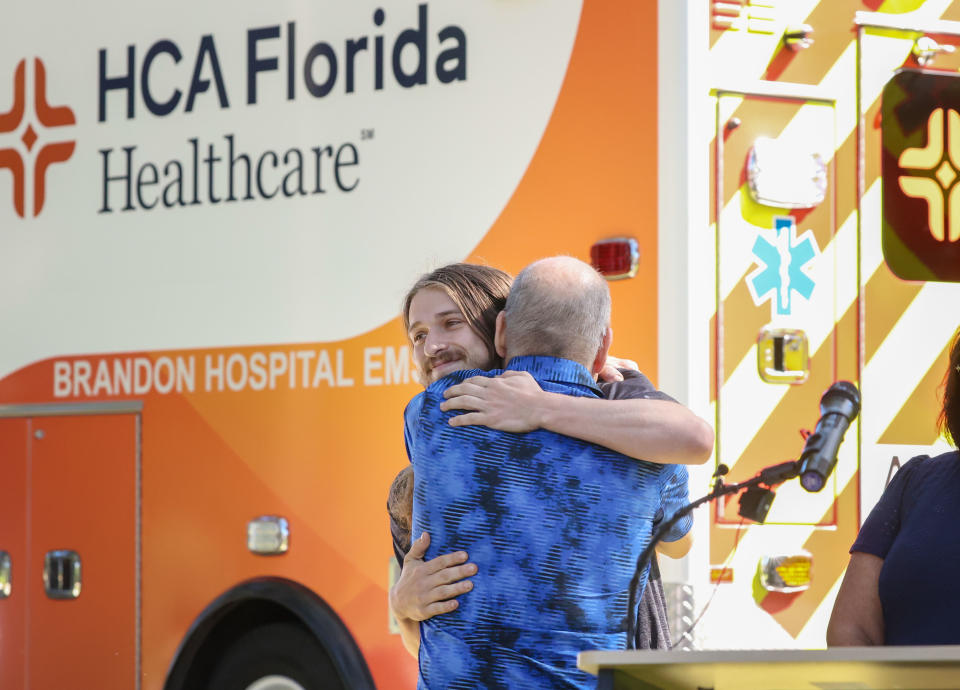A Tampa Bay jogger collapsed. He finally met the bystander who saved him.
BRANDON — Jake O’Brien was taking a break from Christmas shopping and parked in a Valrico gas station when he saw the man lying facedown on the sidewalk and two women anxiously prodding him.
He rushed to help and realized the man’s heart had stopped. He began CPR while one of the women dialed 911.
For about six minutes, he performed compressions on the man’s chest, remembering the instructions from the class he took at university to use the Bee Gees classic disco hit “Stayin’ Alive” to guide his tempo.
Paramedics arrived and took over. The patient, Drew Overlee, 64, had been dead for six minutes but they were able to restart his heart with a defibrillator.
There were tears and hugs Friday as Overlee for the first time met and thanked the passerby who helped save his life. The celebration at HCA Florida Brandon Hospital also paid tribute to Lt. Tobi Porter, a 23-year veteran paramedic with Hillsborough County Fire Rescue who treated Overlee and kept him alive until he reached the emergency department at the hospital.
“I love you, man,” Overlee said, turning to look at O’Brien before telling Porter that she was “the coolest chick of all.”
Overlee’s story is a reminder of how critical CPR can be, hospital officials said. More than 350,000 sudden cardiac arrests occur each year in the United States, according to the American Heart Association. Immediate CPR, which stands for cardiopulmonary resuscitation, can double or even triple a victim’s chances of survival.
Yet, 4 out of 10 Americans said they would not administer the lifesaving technique, citing lack of knowledge, fear of hurting the patient and possible litigation, a 2022 survey by the heart association found. One-quarter of the 1,000 people surveyed were unaware of the good Samaritan laws passed in 50 states and the District of Columbia that give legal protection to those who provide good-faith assistance in a medical emergency.
Overlee would have likely died without O’Brien’s intervention, Porter said. Minutes without CPR would have increased the likelihood of damage to his heart and brain.
“The reason why Drew has his family is because a layperson, a bystander, a witness, stepped in, acted and started that first chain of survival,” Porter said. “When you start CPR, that allows us the minutes we need to arrive in time and to continue that lifesaving measure.”
O’Brien, 27, took CPR as a part of an emergency management certificate he studied for at Florida State University after considering a career as a paramedic. His interest in CPR also partly stems from being born with a hole in his heart.
“It’s kind of surreal because it’s something that you didn’t think that you would ever use,” said O’Brien, who now works in the events industry. “Drew is walking around again. That’s like the best thing you could ask for.”
After having a double bypass heart operation four years ago, Overlee had changed his life. A retired retail and grocery manager, he doesn’t smoke or drink, eats healthily and runs about 40 miles a week.
Still, he had been feeling unwell on recent runs, something he had put down to digestive problems.
As normal, Overlee didn’t have his cellphone and carried no ID when he left home for a 5-mile run on Dec. 22. The last thing he remembers before passing out was a ringing in his ears.
Six months on, his heart is close to being back to normal. Doctors have told him he can resume light jogging. During his speech, he said his near-death experience has made him more humble and he thanked all the hospital staffers and paramedics for their service.
“When you die and when you come back to this, you thank your lucky stars that people like you are still here for people like me,” he said.
Overlee’s heart attack was likely the result of a plaque rupture of the right coronary artery, which did not need a bypass four years ago, said David Goldgrab, an interventional cardiologist with Bay Area Cardiology and Vascular. Two days after Overlee was admitted to the hospital, Goldgrab performed a balloon angioplasty, using a catheter to insert a balloon in the artery to open it up.
Overlee’s CPR was critical, he said, and he urged more people to take CPR classes and be prepared to take action.
“The biggest thing is for people to be trained, and be confident,” he said. “If someone’s dead on the ground, you can’t make them deader. So give it a try.”
Want to learn CPR?
Numerous agencies around the Tampa Bay area offer CPR training, including the American Red Cross. For more information, visit tinyurl.com/2pbackbu or call 813-348-4820.




